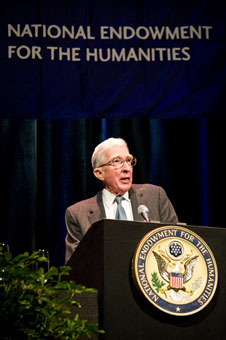main page | 20th-century writers | 20th-century fiction | mid-century american fiction | about literaryhistory.com

John Updike photo, public domain
John Updike (1932-2009)
A selective list of online literary criticism and analysis for the 20th-century American novelist, short story writer, poet, reviewer, and essayist John Updike, favoring signed articles by recognized scholars and articles published in peer-reviewed sources
introduction & biography
"John Updike," ed. George J. Searles. A brief biography and introduction. Also, "John Updike (removed) a guide for teachers, focusing on questions of whether Updike's work is too limited in its concern with the WASP or yuppie environment, and whether it proceeds from a too exclusively male perspective. From the educational publisher The Heath Anthology of American Literature.
"Interview with John Updike." Focuses on the "Rabbit" novels and Updike's longstanding interest in chronicling the terrors and pleasures of sex, marriage, adultery, parenthood and religion that ordinary Americans have experienced over the past 30 years. From the National Book Award Foundation.
Pritchard, William H. The first chapter of Updike: America's Man of Letters is reprinted at the New York Times. Complete book at Questia subscription service. Reviewed in the New York Times 24 Sept. 2000.
Wolcott, James. "Caretaker/Pallbearer." Wolcott says of Updike, "In his native land he blends the roles of novelist, historian, social critic, civics teacher, randy theologian, anthropologist, dermatologist, photorealist illuminator of drugstore aisle and automobile showroom (every shiny accent in place), and caretaker/pallbearer of the New Yorker tradition of scrupulous observation salted with a proper measure of irony, acerbity, dismay and regret, depending on the circumstance or site under inspection." London Review of Books 31 (Jan. 2009).
John Updike's famous essay about baseball, "Hub Fans Bid Kid Adieu," about Ted Williams's last game. Originally published Oct. 22, 1960, in the New Yorker. "Probably the most celebrated baseball essay ever," says the New York Times in this article about the circumstances surrounding Updike's writing it.
Boswell, Marshall. "John Updike." An introduction to Updike from the Literary Encyclopedia, 18 March 2004 [subscription service].
literary criticism: "A&P"
Brauner, David. "Much Ado about Nothing: Boredom, Banality, and Bathos in Late Henry Green and Early John Updike." The Yearbook of English Studies, 42 (2012) [preview or purchase at jstor].
Porter, M. Gilbert. "John Updike's 'A&P': The Establishment and an Emersonian Cashier." The English Journal, 61, 8 (Nov. 1972) [free at jstor].
Saldivar, Toni. "The Art of John Updike's 'A&P.'" Studies in Short Fiction, 34, 2 (Spring 1997) [Questia sub ser].
Wells, Walter. "John Updike's 'A&P': a return visit to 'Araby.'" Wells contends that Updike's "A&P" was influenced by James Joyce's short story "Araby." Studies in Short Fiction 30, 2 (Spring 1993) [Questia sub ser].
the Rabbit novels: Rabbit, Run; Rabbit Redux; Rabbit is Rich; Rabbit at Rest
Ahearn, Kerry. "Family and Adultery: Images and Ideas in Updike's Rabbit Novels." Understanding a writer "who has defeated a High Culture bias against the novel of manners by restricting himself to the supposedly barren settings of America's middle-class cultural homogeneity." Twentieth Century Literature 34, 1 (Spring 1988) pp 62-83 [free at jstor].
Boswell, Marshall. John Updike's Rabbit Tetralogy: Mastered Irony in Motion (U of Missouri P 2001) [complete book avail at Questia sub ser].
Boswell, Marshall. "The Black Jesus: Racism and Redemption in John Updike's Rabbit Redux." Contemporary Literature 39, 1 (Spring, 1998), pp. 99-132 [free at jstor].
Colgan, John-Paul. "Going it Alone but Running out of Gas: America's Borders in John Updike's "Rabbit" Novels." Irish Journal of American Studies 11/12, 1 (2002/2003) pp 73-86 [free at jstor].
Lasseter, Victor K. "Rabbit is Rich as a Naturalistic Novel." American Literature 61, 3 (Oct. 1989) pp 429-45 [free at jstor].
Neary, John M. "'Ah: Runs': Updike, Rabbit, and Repetition." Neary defends Updike from a criticism that his Christianity is cold and selfish. Religion & Literature 21, 1 (Spring 1989) pp 89-110 [free at jstor, click "Preview" or "Read Online"].
O'Connell, Mary. Updike and the Patriarchal Dilemma: Masculinity in the Rabbit Novels (Southern Illinois UP 1996) [complete book avail at Questia sub ser].
Pasewark, Kyle A. "The Troubles with Harry: Freedom, America, and God in John Updike's Rabbit Novels." Religion and American Culture: A Journal of Interpretation 6, 1 pp 1-33 [jstor preview or purchase].
Updike's other fiction
Donahue, Peter. "Pouring Drinks and Getting Drunk: The Social and Personal Implications of Drinking in John Updike's 'Too Far to Go.'" Studies in Short Fiction, 33, 3 (Summer 1996) [Questia sub ser].
Heddendorf, David. "The Modesty of John Updike." The Sewanee Review 116, 1 (Winter, 2008), pp. 108-116 [free at jstor].
Miller, D. Quentin. John Updike and the Cold War: Drawing the Iron Curtain (U of Missouri P 2001) [complete book avail at Questia sub ser]. Reviewed by James A. Schiff in MFS Modern Fiction Studies.
Pinsker, Sanford. "Is John Updike a Dinosaur?" The American Scholar, 69, 1 (Winter 2000) pp 150-3 [free at jstor].
Pritchard, William H. "Updike's Way." Pritchard defends Updike from the criticism of self-absorption leveled in "Twilight of the Phallocrats" by Sven Birkerts and David Foster Wallace. New England Review 21, 3 (Summer 2000) [free at jstor].
Prosser, Jay. "Under the Skin of John Updike: Self-Consciousness and the Racial Unconscious." PMLA, 116, 3 (May 2001) pp 579-593 [free at jstor].
Schopen, Bernard A. "Faith, Morality, and the Novels of John Updike." Twentieth Century Literature 24, 4 (Winter, 1978), pp. 523-535 [free at jstor].
Vargo, Edward P. "The Necessity of Myth in Updike's The Centaur." PMLA 88, 3 (May, 1973) pp 452-60 [free at jstor].
Updike the poet
"John Updike." Updike as a writer of light verse is briefly discussed at the Poetry Foundation, and the texts for 22 of his best known poems are available.
"Inside Game." Updike answers questions about his poem "Ex-Basketball Player." Poetry Foundation.
Greiner, Donald J. The Other John Updike: Poems, Short Stories, Prose, Plays (Ohio UP 1981) [Questia sub ser, complete book avail].
main page | 20th-century writers | 20th-century fiction | mid-century american fiction | about literaryhistory.com
1998-2018 by Jan Pridmore
